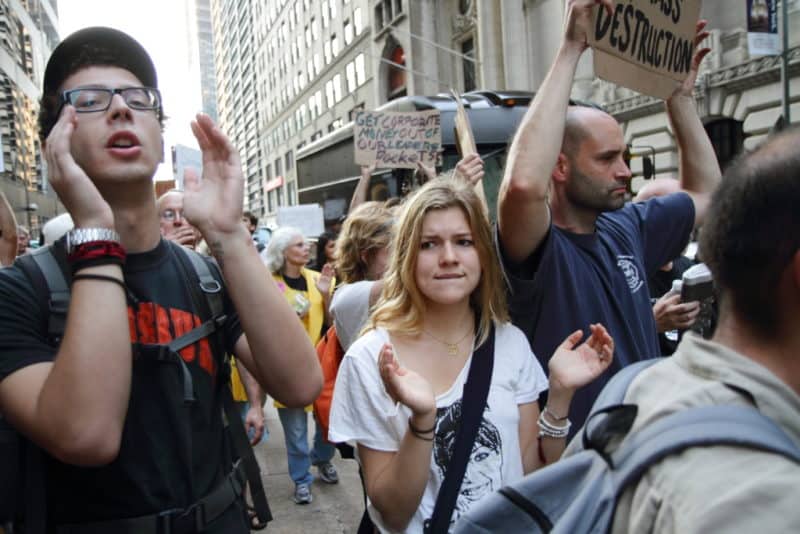Occupy Wall Street has faced criticism from the outset. Since September 17, the protesters have been condemned for a number of things, among them disorganization, a lack of specific demands, and the absence of a unified message and goal. Whether or not you agree with these criticisms, they raise worthwhile questions: what comprises an effective social protest movement, and how does it accomplish anything?
There has, however, been another objection to Occupy Wall Street, one less thoughtful and more catty: the demonstrators have been attacked for being young. “Occupy Wall Street protesters are behaving like a bunch of spoiled brats,” ran a New York Daily News headline. Boston Globe op-ed columnist Joanna Weiss described the participants as “furious young protesters, some of them wearing masks and climbing flagpoles” and went on to clarify that such behavior constituted “a circus—some participants seem to have taken a chute straight from Burning Man.”
Meanwhile, in the first piece to appear in the New York Times on the subject, writer Ginia Bellafante buried her scorn underneath ostensible concern for the demonstrators:
“The group’s lack of cohesion and its apparent wish to pantomime progressivism rather than practice it knowledgably is unsettling in the face of the challenges so many of its generation face—finding work, repaying student loans, figuring out ways to finish college when money has run out. But what were the chances that its members were going to receive the attention they so richly deserve carrying signs like ‘Even if the World Were to End Tomorrow I’d Still Plant a Tree Today’?”
A rant in Forbes by financial consultant Doug Hirschhorn advanced the motif of haughty advice for wayward young people, addressing “generation entitlement” with these words:
“Surfing the net, reading blogs about pointless (although possibly interesting) information… probably not the best use of your time. And call me crazy but spending hours, day after day, for weeks holding up signs in parks or in front of buildings, chanting, singing, complaining about what is wrong or broken in the world, while it may be fun or even what you think has meaning at the time, I am thinking it’s not a great plan for how to get your life and career back on track or even started.”
Comparisons of suffering are pointless: we don’t gain anything by them. Each fight is a struggle all its own.
These attacks are shamelessly personal. They’re portraits that cast the largely twenty-something protesters—who, by the way, are not the only demographic showing up in Zuccotti Park—as hypocritical, stupid, naïve, and spoiled. Why? Are young people not entitled to political opinions, or do opinions simply not count when they come from anyone under 30?
U.S. history makes clear the absurdity of such a notion. This is hardly the first time that students and young people have been at the forefront of a protest movement. Surely the 1960s—the free speech movement, the fight against the Vietnam War—weren’t so long ago that we’ve already forgotten them? Back then, college campuses were exciting, progressive places bursting with the prospect of change. Writing earlier this month in the Washington Post, Martha Woodroof, a former Vietnam demonstrator, challenged Bellafante on her attitude: “When I read her phrase ‘not easily extinguishable by street theater…”—[Bellafante referred to the protests as street theater that couldn’t eliminate the ‘nasty byproducts of wayward capitalism’]—“I wanted to remind Ms. Bellafante that that’s what They (you know, them, the Establishment) once said about the Vietnam War.”
Woodroof continues: “We didn’t mind being thought foolish, being vilified even; we knew we didn’t understand all the intricacies of foreign policy, but we also knew our government was acting in ways that were reprehensible and that someone had to call them on it publicly. We asked ourselves, if not us hippy-dippy, anti-war peaceniks, then who? ”
Given the precedent of being vilified, perhaps we should accept the current wave of disparagement as nothing new, the ritual whereby the establishment welcomes a new protest into the world. But perhaps we should also expect the press and the public to have learned a valuable lesson by now: young people can be leaders. Not only that: young people should be leaders, because (not in spite) of their age. At the base of Woodroof’s comment lies the suggestion students and twenty-somethings may be the only ones willing to attempt such a monumental task as questioning the government, or in today’s case, the Wall Street-corporation-government complex. If not the members of society with fewer professional and personal responsibilities, then whom?
Nowhere has the potential of youth leadership been more apparent than in the Middle East, where, earlier this year, groups of young people sparked the Arab Spring, a wave of uprisings and revolts in Egypt, Tunisia, Syria, Libya, and beyond. American journalists were rightly sympathetic to the rebels, characterizing them as courageous and inspiring. Yet while the organizers of Occupy Wall Street say they were inspired by the Arab revolutionaries, many publications and writers have refused to grant them the same respect. Of course, the U.S. is a democracy, as nearly every country in the Middle East is not; at the end of the day, American protesters are up against nothing as brutal as a repressive dictatorship. But comparisons of suffering are pointless: we don’t gain anything by them. Each fight is a struggle all its own.
For years, my generation—Generation Y, the Millenial Generation—has been charged with detachment. Because of us, adult writers coined the term “Facebook activism, ” and they lectured us that clicking “Like” buttons and signing electronic petitions could never effect real change. Now some of my cohort has leapt from the virtual to the real world: they’ve taken to the streets, their numbers are swelling, and they refuse to leave. They deserve a little more faith.
